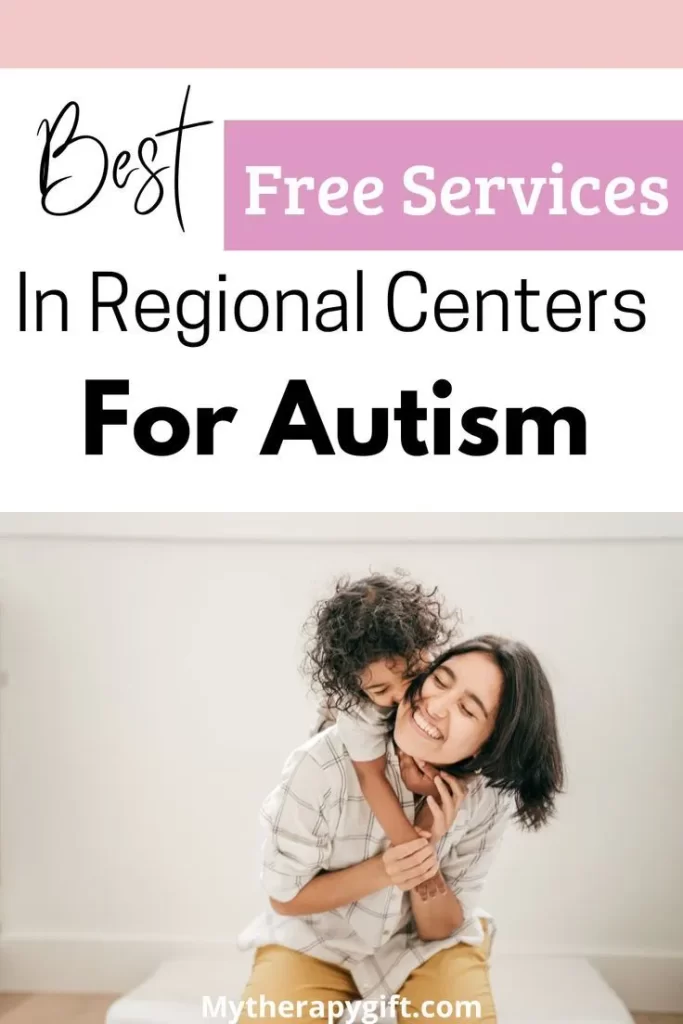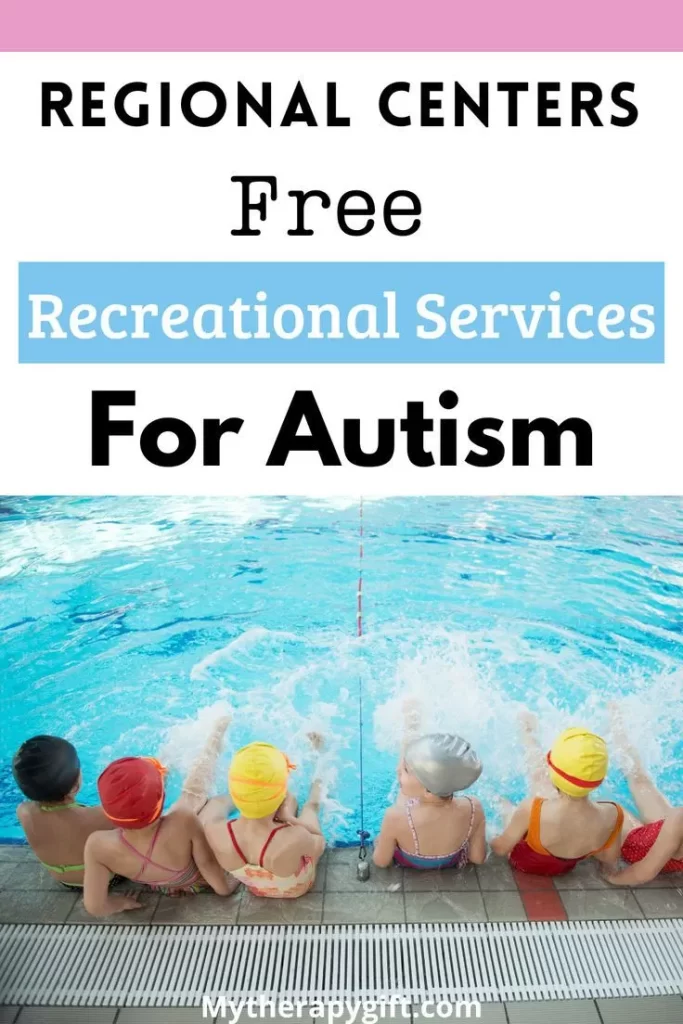Best Free Services In Regional Center For Autism
In this post you will read about the Best Free Services In Regional Center For Autism.

If you’re raising a child on the autism spectrum, you’ve probably had days where everything feels overwhelming. I know I’ve had plenty of them.
From navigating educational support, figuring out therapies, and just getting through the day-to-day demands, it’s easy to feel lost.
That’s where regional centers come in.
Regional centers provide a wealth of support, not only for autistic children but also for teens and adults.
They offer everything from early intervention to independent living programs, and they work with families to meet their unique needs.
In this guide, I’m going to walk you through some of the best free resources available at regional centers and how to access them.
This post may contain affiliate links which means I may receive a commission for purchases made through links (at no extra cost for you). As an Amazon Associate I earn from qualifying purchases. Learn more on my Private Policy & Disclaimer page.
What Are Regional Centers?
Regional Centers are government-funded agencies designed to help individuals with developmental disabilities, including autism spectrum disorder (ASD).
These centers provide access to crucial services that can make navigating autism a little more manageable.
They’re based on the idea that no two people with autism are the same and that each person’s needs deserve individualized attention.
If you’re new to the idea of regional centers, they are often a parent’s first step toward getting connected to therapies, educational support, and social services.
The process of signing up can feel daunting, but it’s worth it in the long run.
You’ll get assigned a service coordinator who works with you to create a personalized plan for your child.
Services And Supports Provided By The Regional Centers
The Department of Developmental Services (DDS) contracts with regional centers to plan, access, coordinate and monitor these services.
- Information and referral
- Assessment and diagnosis
- Counseling
- Lifelong individualized planning and service coordination
- Purchase of necessary services included in the individual program plan
- Resource development
- Outreach
- Assistance in finding and using community and other resources
- Advocacy for the protection of legal, civil and service rights
- Early intervention services for at risk infants and their families
- Genetic counseling
- Family support
- Planning, placement, and monitoring for 24-hour out-of-home care
- Training and educational opportunities for individuals and families
- Community education about developmental disabilities
If you want to know more about Eligibility Assessments – Click Here
The Self-Determination Program (SDP)

One of the most empowering options for families and autistic individuals is the Self-Determination Program (SDP).
This program offers participants more control over their services and supports, giving them the ability to choose how their allocated funds are spent.
Unlike traditional programs where services are chosen for you, SDP allows you to craft a plan that fits your child’s specific needs.
For example, you might opt for additional behavioral therapy, art classes to improve social skills, or specialized tutoring.
The beauty of the Self-Determination Program is that it encourages creativity and independence.
How to Enroll in the SDP
Enrolling in the SDP takes some planning, but the benefits are huge.
First, you’ll need to attend an informational meeting at your regional center, where they’ll explain the ins and outs of the program.
Then, you’ll work with a financial management service to make sure the budget aligns with your goals.
Many families who participate in the program report that it gives them the flexibility they need to help their children thrive.
Resources for Parents of Autistic Children
Early Intervention Services
If your child is still young, early intervention services can be a game-changer.
These services often include speech therapy, occupational therapy, and Applied Behavior Analysis (ABA).
The earlier you start, the better the outcomes tend to be.
According to the American Academy of Pediatrics, early intervention can significantly improve the developmental trajectories of children with ASD.
From personal experience, I can’t stress enough how important it is to get started early. My son started receiving speech therapy at age three (couldn’t sooner due to the COVID lockdown), and he made great progress in those early years.
Regional centers can help you set up these services and guide you through the process.
Allowable and Unallowable Social Recreation Activities
The social recreation program activities that are allowable and unallowable under the Department of Developmental Services (DDS) and federal Medicaid rules.
This list is a non-exclusive list that is meant to guide and further define regional center funded services.
- Allowable outings are defined as either a sport or other recreational activity, where the individual is actively engaged.
- Unallowable outings are defined as entertainment. The client must be an active participant and not just an observer.
An example is that RC can pay for a client to join a soccer team, but cannot pay for them to be a spectator at a live game. RC can pay for them to go to an interactive museum (Science and Industry or a Children’s Museum) but not to an art gallery to view art.
Allowable – Sports and Recreational Activities
- Gym and fitness classes or memberships
- Martial Arts
- All sporting activities – equipment and uniforms as necessary
- Park entrances (Federal, State, County)
- Hiking/biking
- 1:1 service to include private lessons like driver’s training, music and singing lessons
- Art classes and associated materials
- Dance lessons
- Go-karts
- Trampoline parks
- Laser Tag
- Arcades to include coin operated and virtual reality
- Escape Rooms
- Ziplining
- Miniature golf
- Bowling
- School social events – Grad night, prom, dances
Unallowable – Entertainment etc.
- Theme parks and all things related like meals and souvenirs. Includes Disneyland, Knotts Berry Farms, Universal Studios, Legoland, Aquariums, Zoos, etc.
- Out of state activities, unless agreed to by the Planning Team (clients near state borders)
- Casinos
- Sporting events
- Movies and theater
- Clothing
- Groceries
- Meals out in the community
- Birthday parties
- Haircuts, Manicures, Pedicures, etc.
Parent Support Groups
Raising an autistic child can feel isolating, but parent support groups provide a community of people who understand what you’re going through.
Many regional centers offer support groups that focus on helping parents connect, share resources, and encourage one another.
If you are looking for book suggestions, I have a post: “Books for parents about autism to better understand your child.”
Resources for Parents of Autistic Teens
Transition Planning Services
As your child approaches their teen years, you’ll need to start thinking about the future.
Transition planning services are essential to helping teens develop skills for adulthood.
Regional centers offer support in areas like vocational training, independent living, and post-secondary education.
If you are interested in more resources and information on Resources for Transition Age Youth with Disabilities – Click Here.
Autism Society recommends starting transition planning as early as age 14 to ensure your child has the best chance of success.
Social Skills Programs
One of the most common struggles for autistic teens is navigating social situations.
Regional centers often have social skills programs specifically designed to help teens practice interacting with their peers.
Social skills training not only helps teens make friends but also reduces anxiety in everyday situations like going to the grocery store or attending school events.
Therapeutic Support for Teenagers
Many autistic teens struggle with emotional regulation and anxiety.
Regional centers can connect families with licensed therapists who specialize in autism.
Cognitive Behavioral Therapy (CBT) is one popular approach that helps teens learn coping strategies for difficult emotions.
According to research in The Journal of Child Psychology and Psychiatry: “Several case studies and exploratory clinical trials have suggested that CBT may help lessen anxiety symptoms in children with ASD”. Read More.
Resources for Autistic Adults
Independent Living Support
As autistic individuals move into adulthood, they may need help learning how to live independently.
Independent living programs provided by regional centers offer support with daily living skills, such as cooking, budgeting, and managing a household.
These programs also assist with finding housing and employment, helping adults with ASD transition to living on their own.
One of my clients, a young woman with ASD, found tremendous benefit in the independent living program. She went from relying heavily on her parents to managing her own apartment and job with the support of her regional center.
Employment and Job Readiness
Finding a job can be tough for anyone, but it’s particularly challenging for autistic adults.
Employment services through regional centers provide job coaching, resume building, and interview practice to help autistic adults find meaningful employment.
Partner programs with local businesses are also available, giving individuals the opportunity to work in supported environments.
Self-Advocacy Resources
Empowering autistic adults to advocate for themselves is crucial. Regional centers offer self-advocacy workshops where individuals learn about their rights and how to navigate the systems they encounter, from employment to healthcare.
These workshops help build confidence and independence, ensuring that autistic adults have a say in their own lives.
How to Access These Resources
Initial Intake Process
To get started with a regional center, you’ll need to go through an intake process.
This typically involves a detailed assessment of your child’s or loved one’s needs, including a review of medical and educational records.
Once accepted, you’ll work with a service coordinator to create an Individualized Program Plan (IPP) that outlines the specific supports and services your child will receive.
“The IPP will include a list of services and supports that you and your planning team agree will help you meet those goals. IPP meetings can happen as often as your needs or goals change. Your Service Coordinator will monitor this plan regularly. You may call together your planning team at any time by contacting your Service Coordinator.” (Read More)
Navigating the Service System
Regional centers can be a maze of resources, and it’s important to stay organized.
Keep track of your contacts, appointments, and progress through regular communication with your service coordinator.
Don’t be afraid to ask for clarification if something isn’t clear, and remember that you have the right to advocate for the services your child needs.
Tip: If you have a phone call then send an email: “as per our phone call” this way you have a timestamp and a “paper trail” in case things get delayed more than normal.
Overcoming Common Barriers
It’s not uncommon to encounter obstacles, such as waitlists or limited resources.
In these situations, persistence and self-advocacy are key.
Speak with your service coordinator regularly, attend meetings, and ensure that your child’s needs are being met.
If you feel your family isn’t getting the support it deserves, consider reaching out to advocacy groups or legal services for help.
Tip: If you feel that the person in charge of your case is not working effectively you CAN ask for a change. Ask to speak to your case manager and request a change of case worker.
Top Regional Centers for Autism in the U.S.
- https://www.dds.ca.gov/rc/California Regional Centers: Known for their robust early intervention services and transition planning programs.
- Florida Developmental Disabilities Centers: Offer comprehensive support for families, including respite care and vocational training.
- Texas Health and Human Services Autism Program: Provides social skills training and independent living support for autistic teens and adults.
If you are looking for a brief introduction of what every state has to offer an autism family, then you have come to the right place! I Have a Post: “Best Free Autism Resources For Parents You should Know About.”
In this post you read about the Best Free Services In Regional Center For Autism.

To Summarize
Accessing resources through regional centers can feel overwhelming at first, but with the right support, these centers can be a lifeline for families navigating the challenges of autism.
Whether you’re exploring early intervention services, planning for your teen’s future, or helping an autistic adult achieve independence, regional centers offer a range of services to meet your needs.
And don’t forget—the Self-Determination Program is an incredible tool for giving your family more control and flexibility in choosing the services that will make the biggest impact.
No matter where you are on this journey, know that help is available. Stay persistent, stay informed, and don’t be afraid to advocate for the services your child or loved one deserves.






Leave a Reply